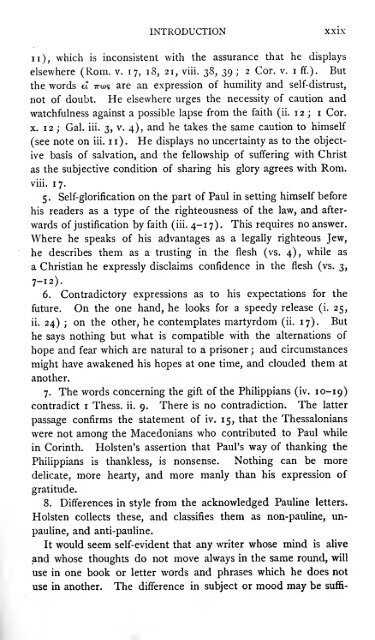Philippians and Philemon - MR Vincent - 1906.pdf
Philippians and Philemon - MR Vincent - 1906.pdf
Philippians and Philemon - MR Vincent - 1906.pdf
Create successful ePaper yourself
Turn your PDF publications into a flip-book with our unique Google optimized e-Paper software.
INTRODUCTION XXIX<br />
ii), which is inconsistent with the assurance that he displays<br />
elsewhere (Rom. v. 17, 18, 21, viii. 38, 39<br />
; 2 Cor. v. i ff.). But<br />
the words d are an expression of humihty <strong>and</strong> self-distrust,<br />
not of doubt. He elsewhere urges the necessity of caution <strong>and</strong><br />
watchfulness against a possible lapse from the faith (ii. 12 ; i Cor.<br />
X. 12 ; Gal. iii. 3, v. 4), <strong>and</strong> he takes the same caution to himself<br />
(see note on iii. 11). He displays no uncertainty as to the object-<br />
ive basis of salvation, <strong>and</strong> the fellowship of suffering with Christ<br />
as the subjective condition of sharing his glory agrees with Rom.<br />
viii. 17.<br />
5. Self-glorification on the part of Paul in setting himself before<br />
his readers as a type of the righteousness of the law, <strong>and</strong> after-<br />
wards of justification by faith (iii. 4-17). This requires no answer.<br />
Where he speaks of his advantages as a legally righteous Jew,<br />
he describes them as a trusting in the flesh (vs. 4), while as<br />
a Christian he expressly disclaims confidence in the flesh (vs. 3,<br />
7-12).<br />
6. Contradictory expressions as to his expectations for the<br />
future. On the one h<strong>and</strong>, he looks for a speedy release (i. 25,<br />
ii. 24) ; on the other, he contemplates martyrdom (ii. 17). But<br />
he says nothing but what is compatible with the alternations of<br />
hope <strong>and</strong> fear which are natural to a prisoner ;<br />
<strong>and</strong> circumstances<br />
might have awakened his hopes at one time, <strong>and</strong> clouded them at<br />
another.<br />
7. The words concerning the gift of the <strong>Philippians</strong> (iv. 10-19)<br />
contradict i Thess. ii. 9. There is no contradiction. The latter<br />
passage confirms the statement of iv. 15, that the Thessalonians<br />
were not among the Macedonians who contributed to Paul while<br />
in Corinth. Holsten's assertion that Paul's way of thanking the<br />
<strong>Philippians</strong> is thankless, is nonsense. Nothing can be more<br />
delicate, more hearty, <strong>and</strong> more manly than his expression of<br />
gratitude.<br />
8. Differences in style from the acknowledged Pauline letters.<br />
Holsten collects these, <strong>and</strong> classifies them as non-pauline, un-<br />
pauline, <strong>and</strong> anti-pauline.<br />
It would seem self-evident that any writer whose mind is alive<br />
<strong>and</strong> whose thoughts do not move always in the same round, will<br />
use in one book or letter words <strong>and</strong> phrases which he does not<br />
use in another. The difference in subject or mood may be suffi-





